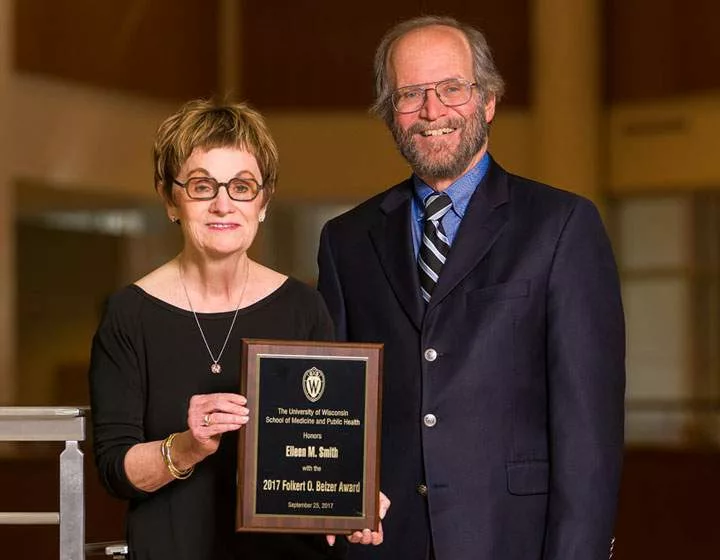Eileen Smith Earns Folkert Belzer Lifetime Achievement Award
Eileen Smith, director of the Wisconsin Partnership Program at the University of Wisconsin School of Medicine and Public Health, received the 2017 Folkert Belzer Lifetime Achievement Award.
The annual award — given during a special presentation at the UW School of Medicine and Public Health Fall 2017 Faculty and Staff Meeting — recognizes an outstanding individual whose contributions have made an impact on the school and on the people and populations it serves.
The intent of the award, says Dean Robert Golden, MD, “is to recognize the ‘unsung hero’ whose contributions have extended over a period of time.”
Indeed, Smith’s history with UW–Madison and UW Health runs deep — with the common thread of transformation woven throughout her career.

“Many of us know Eileen as the founding director of the Wisconsin Partnership Program. She played a pivotal role in transforming the abstract idea of the Partnership Program into a wonderfully productive institution, which in turn fueled our transformation into the nation’s first school of medicine and public health,” shares Golden.
Yet, Smith’s transformative contributions began long before that.
She completed her bachelor’s and master’s degrees at the University of California, Berkley and worked at the University of Minnesota for several years before joining UW Hospital and Clinics. As an associate superintendent during one of the hospital’s most pivotal periods, Smith was deeply involved with the launch and implementation — the transformation — of UW Hospital and Clinics from a state entity within UW–Madison into a public authority.
In 2004, when the Wisconsin Partnership Program was established at the School of Medicine and Public Health, Smith became its founding director. She was charged with the launch and implementation of this new grant-making entity, which would have a transformative impact on the school and the state of Wisconsin.
Her previous role at the hospital prepared Smith to navigate this new set of challenges.
Reflecting on the similarities of the two endeavors, Smith notes, “Both the UWHC transformation and Wisconsin Partnership Program implementation had their respective obstacles, expectations and unprecedented opportunities. Simply put, each was designed to affect significant change, to make great improvements in systems and relationships, and — most importantly — to make a difference in the lives of individuals, families and the environments in which they live, by improving health and well-being.”
The result is an academic health center that is stronger, more accessible to all and better positioned to meet the health challenges of the 21st century.
Former Dean Philip Farrell, MD, PhD, who recruited Smith to the Wisconsin Partnership Program, recalls her strengths, energy and dedication.
“Eileen always has had an extraordinary ability to analyze complex issues,” he says. “She is able to understand how issues relate to community priorities, as well as how to successfully build relationships between community organizations and UW programs.”
Farrell adds, “We are very fortunate Eileen has remained with the Partnership Program because her dedication and patience have made all the difference!”
Today, as the director of the Wisconsin Partnership Program, Smith, her staff and the program’s leadership work to ensure that they uphold the tremendous privilege they have as stewards of the program’s funds. To date, the Wisconsin Partnership Program has committed more than $200 million in grant programs that aim to understand and prevent disease, promote health, advance health equity and support communities to address and ultimately solve complex health problems. Investments support innovative research by UW–Madison faculty and staff to tackle cancer, Alzheimer’s disease, antibiotic resistance, diabetes and more.
Through community-engaged research, academic partners work in collaboration with community organizations to address local health issues. Finally, the program’s significant investments in education have helped expand the school’s public health focus so graduating physicians and health care providers have a broader understanding of public and population health.
When presenting Smith’s award, Golden reflected on her leadership.
“With dedication, passion, political acumen and patience, Eileen has guided the school through challenging times, always focused on health equity and advancement through research, education and community partnerships,” he noted.
Smith is proud of the accomplishments of the hospital and the Wisconsin Partnership Program.
“Many successful outcomes have been achieved in education, research, patient care and service to the state that most likely could not have been achieved without the creation of the public authority and the Wisconsin Partnership Program. It has been my reward to be a part of both,” Smith concludes.